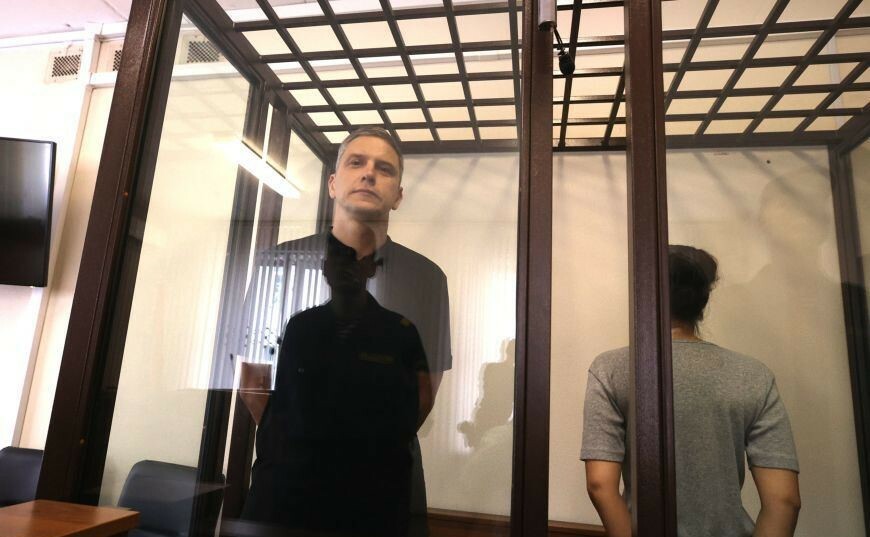On July 26, journalist Pavel Mazheika and attorney Yulia Yurgilevich were sentenced to 6 years in prison by the Grodno Regional Court.
Judge M. Filatov found them guilty under Part 2 of Article 361-4 of the Criminal Code, which pertains to '[providing] other assistance to extremist activities committed repeatedly by a group of individuals through prior agreement.'
According to the case materials, Yulia Yurgilevich allegedly shared information with Pavel Mazheika about the revocation of her lawyer's license and details regarding the consideration of a criminal case against Ales Pushkin. Pavel purportedly published this information on the Be**at website.
Yulia is to serve her term in a general regime colony, while Pavel has been sentenced to a term in a high-security facility.
It is worth noting that Yulia previously reported being held in ‘bestial conditions’ and was denied access to the case files.
The first and second days of the trial.
The Right to Defense project underscores that information regarding the revocation of a license and the results of attorney certification by the Qualification Commission under the Ministry of Justice is readily available on the internet. Based on information from state media, attorney Yulia Yurgilevich was convicted of publicizing information that was already publicly accessible - data about the revocation of her license and her exclusion from the Bar. The Right to Defense project considers such grounds to be only an excuse for criminal prosecution of an attorney for her professional activities and defense of political prisoners.
Para. 16. of the Basic Principles on the Role of Lawyers enshrine the need for governments to ensure that lawyers (a) are able to perform all of their professional functions without intimidation, hindrance, harassment or improper interference; (b) are able to travel and to consult with their clients freely both within their own country and abroad; and (c) shall not suffer, or be threatened with, prosecution or administrative, economic or other sanctions for any action taken in accordance with recognized professional duties, standards and ethics.
International bodies acknowledge that external attributes of the trial, such as holding the accused in a courtroom in a prison uniform and in a cage violate the presumption of innocence. During the trial, defendants should not typically be handcuffed or confined in cages or any other arrangements that suggest they may be dangerous criminals, and the media should not present news in a way that undermines the presumption of innocence.
The Right to Defense condemns Belarus's breach of its international obligations to safeguard the rights and immunities of attorneys.
In light of these concerns, the project strongly condemns the persecution of Yulia Yurgilevich for her professional activities and demands the immediate overturning of her sentence, the termination of her criminal prosecution, and her release from custody.
Judge M. Filatov found them guilty under Part 2 of Article 361-4 of the Criminal Code, which pertains to '[providing] other assistance to extremist activities committed repeatedly by a group of individuals through prior agreement.'
According to the case materials, Yulia Yurgilevich allegedly shared information with Pavel Mazheika about the revocation of her lawyer's license and details regarding the consideration of a criminal case against Ales Pushkin. Pavel purportedly published this information on the Be**at website.
Yulia is to serve her term in a general regime colony, while Pavel has been sentenced to a term in a high-security facility.
It is worth noting that Yulia previously reported being held in ‘bestial conditions’ and was denied access to the case files.
The first and second days of the trial.
The Right to Defense project underscores that information regarding the revocation of a license and the results of attorney certification by the Qualification Commission under the Ministry of Justice is readily available on the internet. Based on information from state media, attorney Yulia Yurgilevich was convicted of publicizing information that was already publicly accessible - data about the revocation of her license and her exclusion from the Bar. The Right to Defense project considers such grounds to be only an excuse for criminal prosecution of an attorney for her professional activities and defense of political prisoners.
Para. 16. of the Basic Principles on the Role of Lawyers enshrine the need for governments to ensure that lawyers (a) are able to perform all of their professional functions without intimidation, hindrance, harassment or improper interference; (b) are able to travel and to consult with their clients freely both within their own country and abroad; and (c) shall not suffer, or be threatened with, prosecution or administrative, economic or other sanctions for any action taken in accordance with recognized professional duties, standards and ethics.
International bodies acknowledge that external attributes of the trial, such as holding the accused in a courtroom in a prison uniform and in a cage violate the presumption of innocence. During the trial, defendants should not typically be handcuffed or confined in cages or any other arrangements that suggest they may be dangerous criminals, and the media should not present news in a way that undermines the presumption of innocence.
The Right to Defense condemns Belarus's breach of its international obligations to safeguard the rights and immunities of attorneys.
In light of these concerns, the project strongly condemns the persecution of Yulia Yurgilevich for her professional activities and demands the immediate overturning of her sentence, the termination of her criminal prosecution, and her release from custody.

